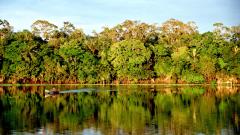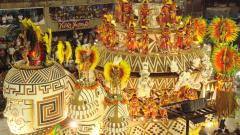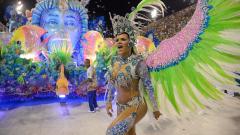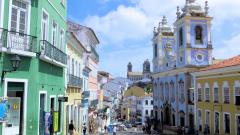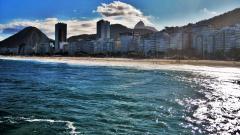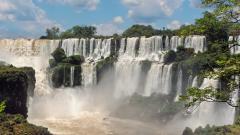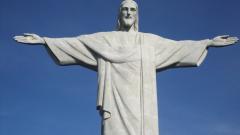 travel to Brazil
travel to Brazil
Brazil is in the eastern part of South America, being the largest country in the continent. Its borders limit practically all the South American countries, except for Chile and Ecuador: to the north of the country are Colombia, Venezuela, Guyana, Surinam and French Guiana; to the south it borders Paraguay, Uruguay and Argentina; to the west with Peru and Bolivia; and to the east is the Atlantic Ocean.
The capital of Brazil is Brasilia, and we also highlight other important tourist cities such as São Paulo, Rio de Janeiro, Porto Alegre, Salvador, Fortaleza and Belo Horizonte. The official language is Portuguese.
Brazil is a country that bases its development and growth in the tourism sector, thanks to its privileged position within the continent. Its great natural heritage is indisputable, since its territory is home to a large part of the Amazon rainforest, as well as having wonderful white sand beaches and small peripheral islands. In the south of the country, on the border with Argentina, you can visit the Iguazu Falls, impressive waterfalls within the Iguazú National Park, which in turn is a place for the protection of animal and plant species. It also highlights in its heritage, the colonial past in cities such as Salvador de Bahia and Belo Horizonte.
The world-renowned Rio de Janeiro is one of the most touristic in Brazil and the first city to be called a World Heritage Site. Visitors choose to take long walks and swim in the Copacabana beach, climb to the hill of Corcovado mountain where the statue of Christ the Redeemer is located to get stunning views of the spectacular skyline of Rio de Janeiro.
São Paulo is one of the most important cities in Brazil economically and the most populated. Its modern and cosmopolitan city makes it a perfect place to enjoy its nightlife and taste the best dishes of Brazilian cuisine.
The country is also known for being a hospitable and cheerful people, whose culture and tradition cross borders. A clear example of this is the Rio de Janeiro Carnival, celebrated almost always annually between the end of February and the beginning of March. This carnival is the most famous, crowded and jovial in the world, where the brilliant costumes, gigantic floats and dancing to the rhythm of samba are the undisputed protagonists of this celebration.
Brazil has been the scene of major international events such as the 2014 Soccer World Cup and the 2016 Olympic Games, which have made the country an attractive and current tourist destination. It is a combination of nature and modernity that give harmony to this immense country that every year attracts millions of tourists eager to discover the Amazon rainforest and enjoy the joy of its people. Football is a star sport and a symbol in Brazilian culture, which is why the Maracanã Stadium in Rio de Janeiro is famous, the largest in the country and where many football matches as well as shows take place, is very famous.
REQUIRED DOCUMENTATION
To enter Brazil, you must show your passport with a minimum validity of six months, and you can stay in the country for a maximum of 90 days (30 days for citizens from Singapore or Kazakhstan). It also must have a return ticket.
The member countries of Mercosur can enter with the identity document, always as tourists and with a maximum period of 90 days. You can request an extension of another 90 extra days, but you cannot exceed 180 days in a year.
For certain countries, the presentation of a visa is mandatory to access Brazil.
EMBASSIES AND CONSULS: https://www.embassypages.com/brazil
PRINCIPAL AIRPORTS OF BRAZIL
- Rio de Janeiro Galeão International Airport, in Rio de Janeiro (Codex GIG)
- São Paulo/Guarulhos International Airport, in São Paulo (Codex GRU)
- Congonhas Airport, in São Paulo (Codex CGH)
- Brasilia International Airport, in Brasilia (Codex BSB)
- Salgado Filho International Airport, in Porto Alegre (Codex POA)
- Salvador International Airport, in Salvador de Bahía (Codex SSA)
practical information
useful information before leaving
Language
Religion
Political regime
Currency
Warnings
Documentation
Vaccines
recommendations
Recommendations before traveling to Brazil
SECURITY
Due to the high crime rate in the country, do not carry much cash or show jewellery or valuable items. Assaults and robberies can occur at any time of the day and in virtually any city. If you are involved in an assault, do not put up any resistance because the assailant could be armed and under the influence of drugs.
It is advised for safety to travel through taxis or authorized vehicles. Do not accept unrecognized transportation services at airports or elsewhere.
Foreign tourists can drive within the country provided their stay is less than 180 days. Both your identity document and your driver's license must be valid.
Avoid walking through isolated areas and neighbourhoods classified as dangerous (see favelas).
When using credit cards, be careful when entering the password and use the bank's internal ATMs. Write down your card details in case of loss or theft.
Keep your belongings well-guarded in public places such as supermarkets, metro and bus stations, airports, etc.
It is advisable to make a photocopy of the passport and leave the original passport inside a hotel safe.
HEALTH
Brazilian public health is free for foreign tourists. Even so, it is highly recommended to have medical insurance.
Use mosquito repellent, dress in comfortable clothes and avoid the places and times most prone to the proliferation of insects to prevent the spread of Zika virus, dengue and malaria, among other possible diseases.
No vaccination is mandatory to enter the country, but there are areas in which it is advisable to be vaccinated against yellow fever.
Travellers from endemic countries are required to have a yellow fever vaccination certificate.
Wash your hands frequently, especially when using public transport and visiting places with a lot of people.
Drink enough mineral water to avoid dehydration.
Avoid drinking tap water, and check that the food has been disinfected before.
There are beaches where swimming is prohibited due to pollution mainly, as in many beaches of the State of Santa Catarina and São Paulo. For more information, check with the government of Santa Catarina and the government of São Paulo.
CLIMATE AND TEMPERATURES
Temperatures are usually quite stable throughout the year, around 82ºF in the north and 68ºF in the south. Depending on the altitude, the pressure and the proximity of the ocean, the climate varies since it has a very large territory where several meteorological factors can be accommodated.
When found in the southern hemisphere, the seasons of the year are different from those in the northern hemisphere. Winter in Brazil begins in June and ends in September, where temperatures can drop below 32ºF in the south and southeast. In coastal and mountain areas temperatures can drop suddenly regardless of the time of year, so it is recommended to take warm clothes. The summers are very hot, reaching 104ºF.
BUSINESS HOURS
The shops usually attend from 08:00 to 18:00. Shopping centres are open from 10:00 a.m. to 10:00 p.m. from Monday to Saturday, and from 2:00 p.m. to 8:00 p.m. on Sundays and holidays. The banks are open from 10:00 a.m. to 4:00 p.m.
TIPS
The tip is usually included in the restaurants and bars account, being 10% of the total cost. In transport services, it is not expected to receive a tip, and in hotel and tourist services if it is convenient to leave a tip of 10%.
ELECTRICITY
The voltage in Brazil is between 110 and 220 volts depending on the region. The types of plug used are those of type C and N.
TELEPHONES OF INTEREST
The phone code is +55.
In cases of emergency, the following telephone numbers are available: firemen (193); civil police (197); military police (190); civil protection (199); mobile emergency service (192); State Police (198).
TIME ZONE
Brazil's time zones are UTC-2 at the east end, UTC-3 in most of the country and UTC-4 in the west.

